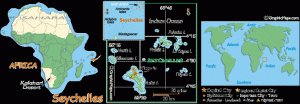Hint: It’s Not Iraq or Afghanistan, But Rather,
A Celebrity Vacation Haven
                                                                                                                                                                                       Â
Â
While most Americans are focused on conflicts in Iraq and Afghanistan, primarily because we have troops in active combat there, potentially significant threats to the U.S. are simmering elsewhere, from China to Russia, from India to Pakistan – and one of the world’s most secluded celebrity tourist destinations may prove to be the Cuba of the new millennium.
Â
That’s the opinion of Sir James Mancham, the first president of an island country called the Republic of Seychelles, a favourite vacation destination for stars like Keanu Reeves, Sean Connery, Jodie Foster and Prince William. Situated near the center of the Indian Ocean, Seychelles is a nation of 115 islands in the Indian Ocean, 930 miles east of mainland Africa, northeast of the island of Madagascar. More importantly, it sits in a position that makes it advantageous strategically in a military conflict for any aggressor near the Indian Ocean – China, India, Pakistan, Russia, North Korea – who needs a refueling station for aircraft or a port for ships.
Â
All the countries in the region have active embassies in Seychelles, while the U.S. is conspicuously absent, Mancham said.
Â
“I remember a time when Cuba was considered an inconsequential little sandbar off the Florida coast, filled with casinos and showgirls,†Mancham said. “That is, until Marxists took over and the Russians deposited some missiles there, a scant 90 miles from the United States. Suddenly, it became a very important little sandbar.â€
Â
Mancham speaks from experience. Seychelles was given independence from Great Britain in 1976, and Mancham was elected its first president. A year later, Marxist rebels staged a coup d’état, ousting Mancham from office. He escaped the country and lived in exile for 20-plus years until the Cold War ended. He returned to Seychelles as an elder statesman with a view to reunify his divided country country.
Â
“No country is small if it is surrounded by the sea,†Mancham said. “Consider that this region houses China, whose impact on the U.S. economy is immeasurable. In addition, India and Pakistan are two neighbors whose religious malevolence towards each other surpasses even that of the myriad Middle Eastern conflicts. Also, they both have nuclear capability and absolutely no fear of the bomb. To our east is Africa, whose natural resources are of great interest to China as well as American business interests. For the U.S. not to have a diplomatic presence in Seychelles – where embassies represent each of their allies in the region – is an unconscionable omission of mythic proportions.â€
Â
The growing competition for power and influence in the Indian Ocean, the world’s primary energy and trade seaway has certainly put the Seychelles at the center of superpower rivalry. Only on the 1st of September, 2009, China and Seychelles signed an agreement for military collaboration. Two days later, the U.S. sent the Stuttgart-based Commander of the U.S. Africa Command, General William Ward to assure Seychelles that the U.S. is committed to a partnership towards “the common objective of peace and security in the region and around the world.â€
Â
“The U.S. supports new democracies, but China holds great power over the U.S. economy. Diplomacy would rule the day, but with no embassy in a strategic, as well as neutral, country in the region, the U.S. would lack a powerful tool and ally for stabilization and peace,†Mancham stated.
Mancham, whose autobiography, Seychelles: Global Citizen (www.paragonhouse.com) traces the roots of the country and how it has grown into its strategic and diplomatic significance, believes that global geo-politics is not a regional phenomenon. Instead, it is a complex, but singular, tapestry. The slightest pulled thread in the Far East can have wide ranging implications in the west.
Â
Â
